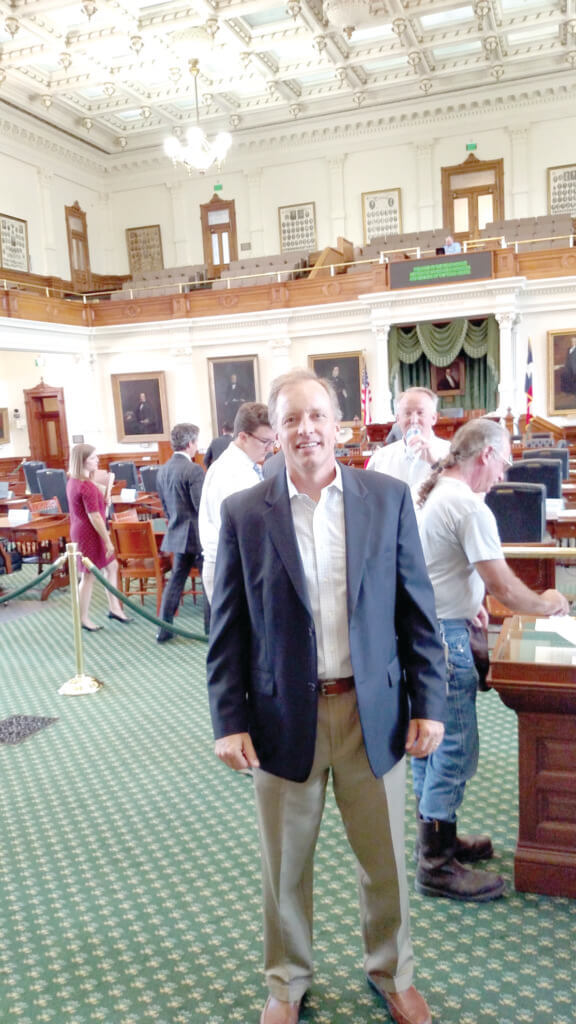
Tim Mattox, an advocate for annexation reform, spoke at the Senate State Affairs Committee on Sunday afternoon in support of Senate Bill 6, which puts annexation into the hands of voters.
By LYNETTE HAALAND
Four Points News
Senate Bill 6 — which would give communities the right to vote on whether or not they want to be annexed by a city — was approved by a state Senate panel on Sunday during the special legislative session.
SB 6 was heard in the Senate State Affairs Committee on Sunday afternoon. Senate committees met over the weekend, approving bills for the Senate to consider this week.
“HB 6 has been filed and referred to Land and Resources,” said Roger Borgelt, attorney of Borgelt Law. “The bills (HB 6 and SB 6) are virtually identical to each other and the conference committee report that was filibustered in the regular session, so they both have all the language necessary for River Place.”
On Sunday, the majority of a dozen speakers at the Senate committee hearing were in support of SB 6, Borgelt said. Tim Mattox, an advocate for annexation reform, was one of those speakers. He is an 18-year resident of River Place, father of four and a member of the homeowners association board.
“I became involved in this issue because I saw a number of families and couples on fixed incomes being impacted by massive water rate increases associated with the city of Austin taking over our MUD,” he told the committee.
The city of Austin is in the final stages of annexing River Place, which is to be complete by the end of this year. Annexation is a multiple year process and at this point, many River Place residents have been vocal about opposing annexation.
Mattox’s research shows that the potential impact of annexation on property taxes and electric utility rates would be in the thousands of dollars per household per year with no improvement in services and limited input or say from the affected property owners, he said.
“Forced annexation means that cities do not have to get buy-in from residents via a public election, and cities can impose new regulations, higher taxes, and sizeable debt obligations on Texans who choose to live outside a city’s jurisdiction,” Mattox said.
“Those residents already pay gas tax, sales tax, school property taxes, ESD tax, and, in the case of Austin, a health district tax. But, that isn’t enough,” Mattox said.
“Austin wants to significantly further raise property tax and utility rates to pay for out of control spending.”
He added that within ten miles of River Place, there is no library or police substation, and the commute to and from downtown can be close to an hour at rush hour. “There are no plans to address any of this. Just to take the residents’ money,” he said.
Mattox wrapped up his comments on Sunday stating SB 6 protects the property rights of Texans who choose to live outside the city and it ends forced annexation.
Dan Kutz, a River Place resident, also shared his support of SB 6 in an Austin American-Statesman report: “(Annexation) will increase my taxes and utility bills through Austin Water while reducing quality of government. I deserve the basic fairness of a vote and feel certain my neighbors will reject annexation from the city of Austin.”
On Sunday, the Senate State Affairs Committee heard Mattox and others and voted 7-2 in favor of SB 6. The two dissenters were Democratic Sens. Eddie Lucio Jr. of Brownsville and Judith Zaffirini of Laredo.
The annexation vote measure would require cities in large counties (with populations of 500,000 and greater) to get voter approval if more than 200 people live in an area targeted for annexation. In areas with fewer than 200 people, a city would have to get signatures from more than half of the property owners.
It has been close to 20 years since annexation has been reformed, said Sen. Donna Campbell, R-New Braunfels, an author of the annexation reform bill.
Campbell stated in a Statesman report that there is need for reform because annexed residents have to take on city debt, city ordinances and city taxes without a vote. “That is not what Texas is about,” Campbell stated.
The Statesman also reported that city officials from Austin and Fort Worth were among those testifying against SB 6 at the Senate committee hearing. Sugar Land’s mayor claimed the legislation would undo years of strategic partnership work on areas it plans to annex. The Texas Municipal League spokesman said SB 6 would change city finance across the state. He cited that while many other states require voters to approve annexations, those states generally collect more taxes to get municipal work done.
Giving Texans the right to vote on annexations is one of Gov. Greg Abbott’s 20 priorities being considered in the 30-day session that started on July 18.
“The Senate has a goal of having all its bills passed and sent to the House by Thursday,” Borgelt said. The House is a different matter, though, and its timeline will become more clear this week after the vote on sunset for the Medical Board.

